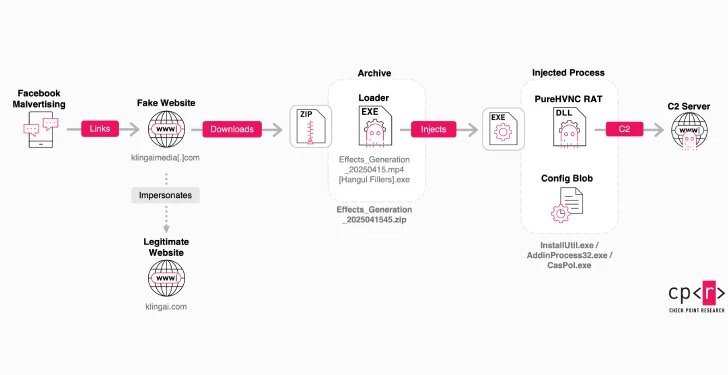Unmasking the Cyber Threat: Fake Kling AI Facebook Ads Targeting Millions with RAT Malware
In the rapidly evolving landscape of cybersecurity, threats often manifest in new, unsuspected forms, taking even the most vigilant internet users by surprise. Recently, a cunning scheme has emerged, preying on millions of Facebook users. This involves the use of fraudulent ads promoting “Kling AI,” an allegedly cutting-edge artificial intelligence tool. While the name may conjure images of futuristic technology, the true nature of this scam is far more nefarious. These ads serve as a vector for RAT (Remote Access Trojan) malware, potentially compromising 22 million devices.
The Conspiracy of Kling AI: Unveiling the Threat
Imagine mindlessly scrolling through your Facebook feed, where ads touting revolutionary technology frequently appear. The lure of Kling AI promises advancements for AI enthusiasts, creating intrigue for anyone passionate about technology. Yet, these appealing ads act as a digital trap, tempting users to download malware disguised as an AI tool.
RAT malware, notorious in the cybersecurity sphere, grants hackers unauthorized remote access and control over victimized systems. Once installed, these malevolent entities can pilfer private data, surveil user activities, and potentially access a treasure trove of personal and professional information on the infected device.
How the Scheme Works
The architects of this operation have crafted a meticulously executed plan to ensnare unsuspecting users. Here’s how it unfolds:
- Baiting with Authenticity 🎣: The ads are ingeniously crafted to mirror authentic posts, complete with striking graphics and compelling descriptions. This semblance of authenticity exploits the inherent trust users place in Facebook’s ad network.
- Redirecting to Deception 🔍: Once users click the ad, they’re redirected to a webpage that emerges with similar authenticity. Here, users are enticed to download the so-called Kling AI software.
- Delivering the Payload 💻: Instead of accessing an innovative AI tool, users inadvertently download RAT malware onto their systems.
The Consequences of a RAT Attack
Having RAT malware on your device can result in severe implications. Once installed, malicious actors can:
- Access Personal Files: Brace for potential data breaches, which may include sensitive documents, personal photos, and more.
- Monitor Online Activity: Every action you take online becomes an open book, deeply compromising your privacy.
- Gather Login Credentials: From email to banking, all your accounts are at risk if login credentials are made accessible.
Protecting Yourself from Cyber Deceptions
With such looming cyber threats, safeguarding oneself against these deceptive tactics is crucial. Here are vital measures to protect yourself:
- Stay Informed 🛡️: Knowledge is your first line of defense. Keep up-to-date with the latest cyber scams and threats.
- Verify Before Clicking 🔗: Always authenticate ads before engaging, especially those offering sensational deals or tech tools.
- Install Security Software 🔒: Use updated anti-virus and anti-malware tools to detect and neutralize threats.
- Regular Software Updates ⏰: Consistently update your operating system and applications to address and mitigate vulnerabilities.
Final Thoughts
The digital realm is teeming with hazards, with cybercriminals persistently refining their tactics to exploit gullible users. The fraudulent Kling AI Facebook ads underscore the creativity and daring nature of today’s cyber threats. Raising awareness and practicing cautious digital habits are crucial to navigating these cyber minefields. Remember, in the sphere of cybersecurity, vigilance isn’t optional but a necessity.
For further insights and updates, keep tabs on The Hacker News, your reliable source for the latest developments in cybersecurity! 📰🔐



















































